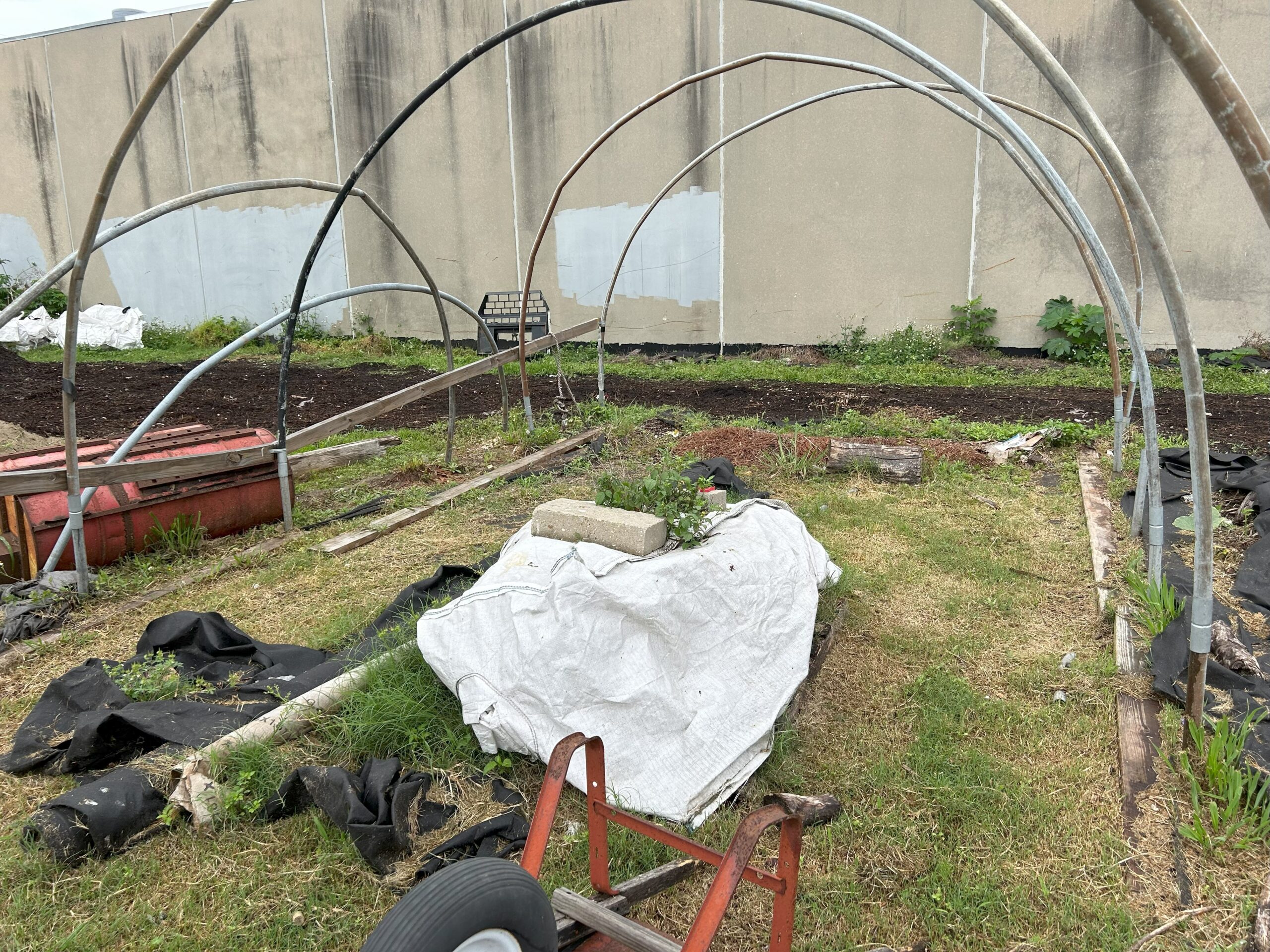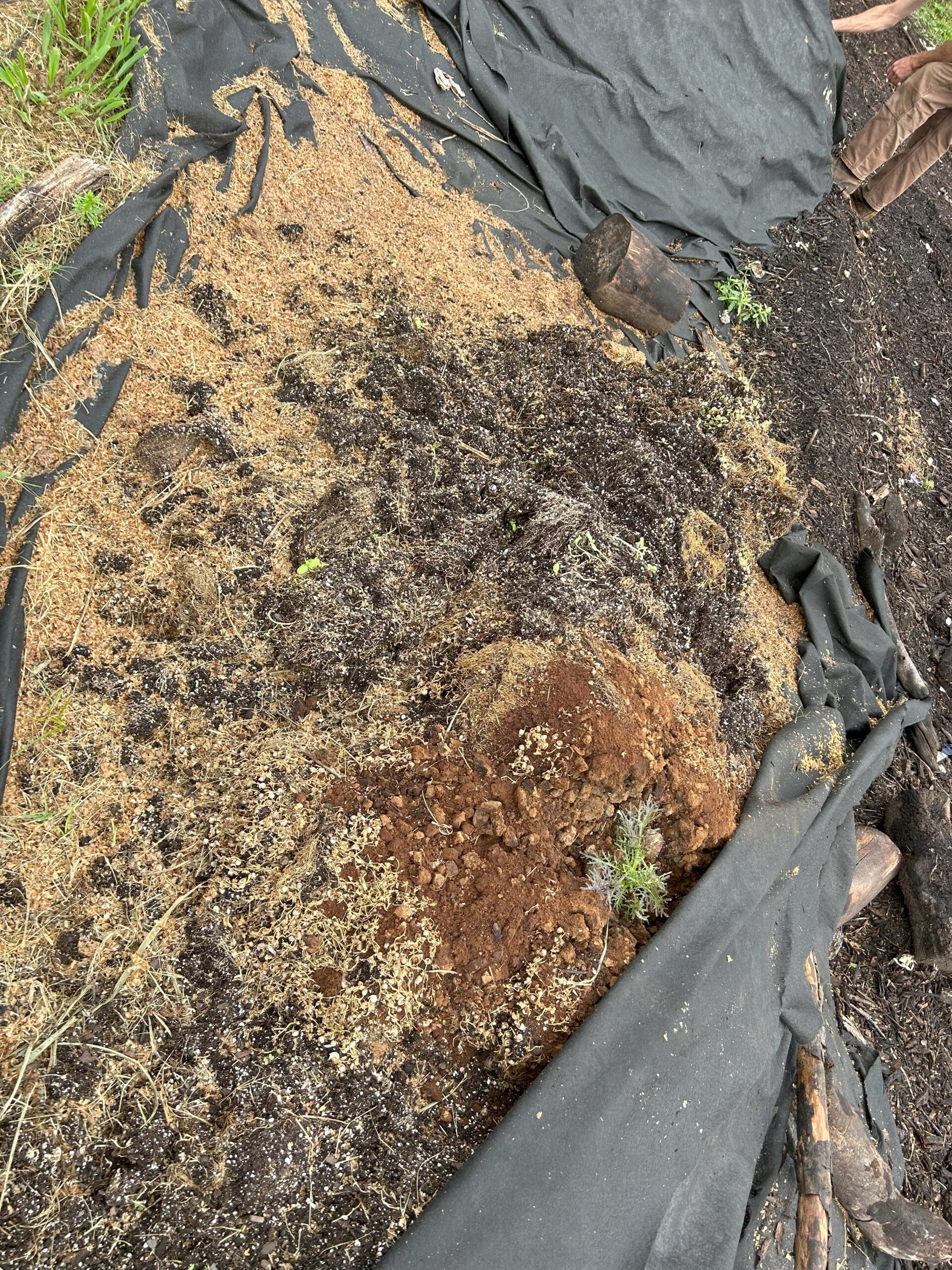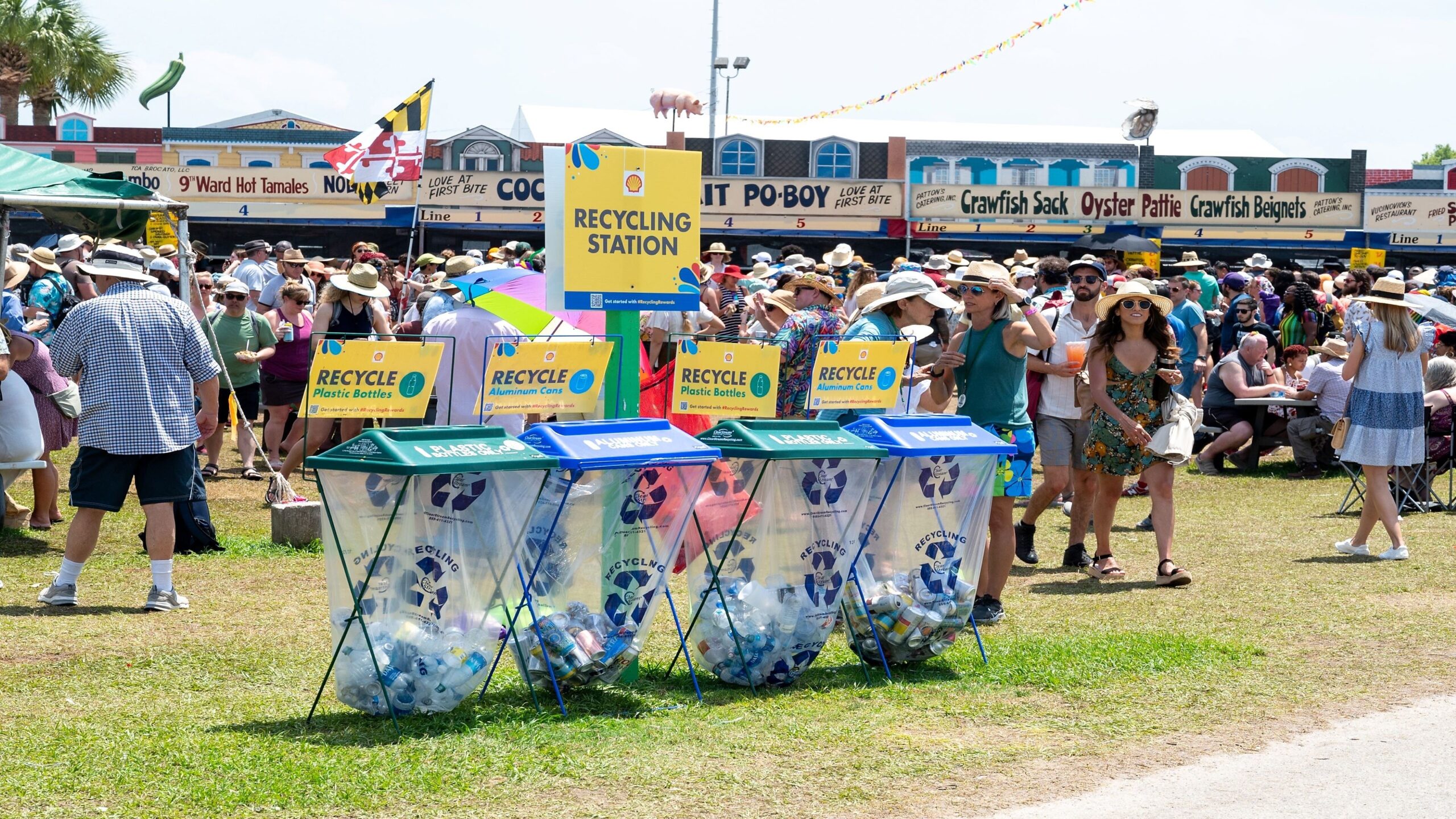
Schmelly’s Dirt Farm’s Most Developed Composting Pile
In reference to New Orleans’s rich cultural diversity and background, the city is often described as full of life. The dirt beneath the city, however, is teeming with life as well. Only a few blocks from the heavy traffic merging onto I-10, off of Olive Street, there is an agrarian driveway distinguished from the rest of the urbanized area. Short tropical palmettos with vibrant green leaves rise from piles of mixed vegetation and debris. The centerpiece of the site is the luminous brown mounds of compost, comprised of food scraps and wood chips. Welcome to Schmelly’s Dirt Farm.
These dirt mounds may not be traditionally beautiful – and their pungent scent doesn’t help— but they represent a solution to a much larger issue at hand: food waste.
New Orleans is a food city. Whether you’re a tourist or a resident, there are a variety of diverse cultural cuisine options. Similar to any urban area, a notable percentage of food waste is destined to pile up at the local landfill.
Food waste is a local as well as global burden, due to its negative environmental and economic impacts. The problem is rooted in a range of systemic issues, particularly ideological mishaps on how society values and understands food and the environment. Many people often don’t realize that food has, or at least can have, a circular lifecycle. Schmelly’s dirty compost piles are one of the phases in that lifecycle. A factor of Schmelly’s mission is to strengthen the bonds of this natural ecosystem.
The roots of Schmelly’s can be traced to 2006, in the aftermath of one of New Orleans’ darkest moments, Hurricane Katrina. Nicola Krebill, the owner and founder of Schmelly’s, traveled from Chicago to New Orleans to offer volunteer assistance following the natural disaster. Prior to working in composting services, Krebill was a grade school teacher. While volunteering in New Orleans, however, they found their passion in sustainable farming.
Krebill identified notable holes in the city’s agricultural sector, and began to carve out Schmelly’s mission. Prior to Schmelly’s, Krebill served on the board of the non-profit Grow Dat Youth Farm, a community farm that gives local youth leadership opportunities. Fueled by their background in teaching, Krebill sought to give Grow Dat Youth Farm graduates employment opportunities. “I wanted to start a for-profit company that could potentially create meaningful jobs for graduates of Grow Dat Youth Farm, doing sustainability work,” they explained.
Krebill researched composting practices in New Orleans for the nonprofit New Orleans Food and Farm Network. In 2013, this nonprofit lost its funding, and Krebill was laid off. “After losing my job, I began to think about starting a composting company,” he said. Schmelly’s was officially born in 2014.
Schmelly’s center of operations is at the Dirt Farm, where the composting process is conducted. A key business component, however, is picking up compostable materials from their partnered businesses, mostly restaurants. Daily, Krebill or another Schmelly’s employee will drive their bright green truck around New Orleans for pickups. Each of these partnered businesses receives a bright green compost recycling bin that can hold up to 50 gallons of materials.
One of their first partnerships was with a local New Orleans coffee shop and bakery, Hey Cafe. Tommy LeBlanc, a Hey Cafe employee, noted that sometimes “our compost got too full, [and] we had to try to order additional pickups.” Most clients have weekly pick-ups that are taken to the Dirt Farm and dumped into the newest pile of compost.

Schmelly’s pickup truck
The United States Environmental Protection Agency defines composting as “a controlled aerobic process that converts organic materials into nutrient-rich amendment or mulch through natural decomposition.” Krebill defines composting as a “process where organic material breaks down naturally with the help of microorganisms, bacteria, and fungi.”
Nearly all food scraps are compostable. Nonfood compostable options include paper and cardboard, although, according to Krebill, “fruit and vegetable food scraps decompose much better.”
At the Dirt Farm, there are eight mounds of compost, each in a different stage of the process. The mound on the far right, with visible food scraps, is the newest pile. Every other pile sits for a month before getting “turned bucket by bucket,” according to Krebill. The leftmost pile is eight months old.
As a small organization, Schmelly’s has limited technological and human infrastructure. Krebill is the only full-time employee. Schmelly’s has six part-time employees, with only two of these employees working each day. Each pile-turning process takes a few weeks to finish.
Currently Schmelly’s is a for-profit organization. However, this hasn’t always been the case. “During the start-up, [restaurants and coffee shops] would partner with us for compost pickups, but we were only receiving their food in return,” said Krebill. This friendly barter system may not have been financially profitable for Schmelly’s, but it helped them establish a name and highlighted the significance of composting.
“We were one of the first clients [Schmelly’s] inherited,” said LeBlanc. The shop’s composting network closed, and “instead of saying we’re not doing this anymore,” Hey Cafe utilized Schmelly’s. Hey Cafe’s previous composting network was a “friend of Nico’s;” therefore, it was “easy to transition to absorb them as a client.” Rather than think of himself as a client, LeBlanc thinks of the partnership as a “business friendship.”
After the first few years of business, Schmelly’s adapted its structure to for-profit and began charging businesses for compost pickup. In 2016, they became an LLC.
Schmelly’s opts to grow horizontally to focus on their speciality–composting. While their company creates “green jobs,” there is only so much they can grow vertically while maintaining the nature of the business. “If we grew big, we would have to diversify, which would mean I would be working in an office,” said Krebill, who enjoys the hands-on experience of working on the Dirt Farm.
Despite the limited vertical growth, Schmelly’s expands with their community partnerships in establishing better composting initiatives around New Orleans. This growth is the byproduct of their sturdy composting roots, with a goal to create the best fertilizer in the New Orleans market.
Schmelly’s wants to grow its potting soil arm, to improve its overall composting business practices. At the Dirt Farm, there is a half-constructed greenhouse, with a pile of dense composting soil, busy with crawling worms. “The greenhouse would be for planting and testing the potting soil,” Krebill said. This goal has been a work in progress for a few years.

Greenhouse Soil Project
“Composting materials take a long time to break down…so when [farmers and gardeners] buy our compost and then they’ll ‘screen’ it through a screen, and then it’ll come out fine,” Krebill explains. This fine compost is, essentially, potting soil. But Krebill wants to sell soil to customers directly.

Soil Project
Another goal of Krebill’s for Schmelly’s is to expand work with weddings and festivals. It’s not surprising that News Orleans offers a big market for festivals. According to New Orleans.com, there are over 130 festivals in the city per year.
Krebill is considering a partnership with Grounds Krewe, a nonprofit that aims to promote waste prevention, recycling, and sustainable products at New Orleans special events. They have worked with a variety of different groups that are related to the organization and development of festivals, particularly the New Orleans Jazz and Heritage Foundation. This nonprofit reached out to Krebill and Schmelly’s about organizing compost initiatives with future local festivals that they run, such as Jazz Festival.
Grounds Krewe employees brainstormed a few potential composting layout structures for Jazz Fest. One employee mentioned the use of compost bins, since everyone is already used to using recycling bins.

Jazz Heritage Festival Recycling Station
“We find the best part about those is the fact that they’re clear bags…people that are too lazy to read or coming up from behind the bins…can see it’s nothing but cans…it’s nothing but plastic or…it’s nothing but food,” an employee of Grounds Krewe says. These bins would be introduced at a “small scale,” like “starting with the food vendors first,” and training them on what certain materials can be compostable.
Krebill agreed that these initiatives need to start on a small scale but also acknowledged the need for more hands-on human infrastructure, specifically “back of house” and “front of house” awareness. Krebill refers to “back of house” as kitchen staff need training, particularly the “lead chefs, to understand the systems,” and what food items are compostable. Schmelly’s has done similar training with restaurant kitchen staff in the past. “Front of house” in festival terms is the food-ordering public.
“’Front of house’ services is where all the contamination comes through,” Krebill says, referencing the people “too lazy to read,” who don’t discard their waste in the correct bin. A solution to this is volunteer groups staffing trash stations.
Schmelly’s wants to open a second composting site in the neighboring parish of St Bernard. Krebill described their current site as “over-crowded.”
“It would be better to spread out our current equipment, such as trucks to another location, to open up more room for composting activities” at the Olive Street location. A large factor in opening this site is finding and developing a partnership with the Saint Bernard Parish government. Schmelly’s is working with the Meraux Foundation, a Saint Bernard-based non-profit focused on improving the local environment, to make this happen.
Schmelly’s has grown and developed tremendously as a business. The efforts to accomplish their goals are starting to sprout, but they aren’t ripe yet. These are a few interacting factors that present complex barriers against Schmelly’s growth as a business and aim to limit food waste in the community:
This could be the most significant barrier because New Orleans can’t change its location. Sitting on the edge of the Gulf of Mexico, the city’s positioning puts them at greater risk of natural disasters. However, what is not commonly discussed is how New Orleans’ proneness to natural disasters and flat landscape are significant barriers when limiting food waste.
As a result of New Orleans’ mostly flat landscape, the city often runs out of room for waste disposal. In response, according to NOLA.com, landfills in New Orleans and surrounding parishes dump the city’s waste into “garbage mountains.” After natural disasters such as Hurricane Katrina, 100-percent of household waste went to these garbage mountains. Schmelly’s partnership with Grounds Krewe is significant to limiting these garbage mountains because a solid percentage of this waste is coming from tourist populations. Therefore, Schmelly’s drive to limit food waste at festivals can be influential to New Orleans’ health, especially in the aftermath of natural disasters.
A partnership with the Saint Bernard government would be huge for Schmelly’s because they’ve had difficulties collaborating with other local governments. “Orleans’ parish hasn’t been interested in talking with us about these ideas, and Jefferson Parish is so corrupt,” Krebill says.
Jefferson Parish also only has private landfills. Krebill says one of the barriers to enacting a composting site is the relationship between the owners of the private landfill and their parish’s council members. “The city council members and landfill owners are old high school buddies,” they’ve heard. Despite Jefferson parish’s potential bias, a more noteworthy barrier is the economic stigma about starting a composting site in that location.
“They might lose money at the landfill if I started composting there,” said Krebill. If a dirt farm began in Jefferson Parish, the landfill may or may not lose money; however, it would be economically viable for the parish in creating new “green jobs.”
Former Head of Food Rescue NOLA, Kelly Haggerty writes, “food waste organizers are still in the early stages of establishing infrastructure.” The limited food waste infrastructure has caused financial insufficiencies for organizers like Schmelly’s. In 2017 Haggerty interviewed Krebill and discovered Schmelly’s had to measure their own bins to determine much food they were recovering. With no inherent oversight of food management infrastructure, this task takes Schmelly’s time and money, without any profit output.
Haggerty agrees with Krebill, that the crucial factor for improving New Orleans’ food management infrastructure is the relationship between food waste organizers and the local government. Haggerty noted the Department of Sanitation has made strides in recent years in working with these green organizations. In 2018, the New Orleans City Council connected with the Composting Network to launch composting into the city’s recycling initiatives.
According to a 2014 National Waste & Recycling Association survey, 72 percent of Americans don’t compost in their homes. “Many people don’t understand much about composting, or even have negative associations with composting because of the potential for food scraps to smell bad,” said Krebill. “Public education and workshops on composting and food waste can be influential in reshaping this common ideology towards a practice that can help our environment.”
Despite the ongoing interacting factors that limit food management and composting practices, Schmelly’s aims to combat these issues, utilizing their resources around the community. “I love sitting down with people and talking about solutions to these problems,” said Krebill.
 NOLAbeings
Multimedia artist Claire Bangser created NOLAbeings as a portrait-based story project that marries...
NOLAbeings
Multimedia artist Claire Bangser created NOLAbeings as a portrait-based story project that marries...
 Data corner: Adobe Suite (create a PDF, social media graphic, presentation, edit a photo and video
Data corner is where you go to work with analytics and top tech skills. It takes on everything from PERL and SQL to Canva and Sprout Social.
Data corner: Adobe Suite (create a PDF, social media graphic, presentation, edit a photo and video
Data corner is where you go to work with analytics and top tech skills. It takes on everything from PERL and SQL to Canva and Sprout Social.
